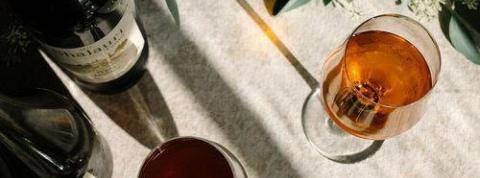
Organic and responsible: The wine transition
The desire for proximity, health, transparency and short circuits, for the last ten years or so and a collective awareness, many markets have been converging towards more responsible models. The wine sector is not left behind, and is also undergoing a profound change, with a significant growth in organic-labeled wines. Between economic alternatives, opportunities and new expectations, let's zoom in on this label which is seducing beyond the French borders.
Explanations
Everything cannot be organic.
Not to be confused with biodynamics, organic wine production is based on the limitation of the use of chemical pesticides during the cultivation of the vines, as well as the number of inputs during the wine-making process. This process, which is very controlled and meets strict specifications dictated by the Agence Bio, is part of an in-depth effort on the part of winegrowers.
Indeed, during the average duration of conversion of a vineyard, which is three years (renewal of the land, adaptation of the grapes...) the yield of the vineyard is clearly lower and implies important material and administrative investments. Efforts that are certainly worthwhile, given the evolution of the market in recent years.
Growth and transformation
The main reason why so many winegrowers are turning to organic farming is that it is a new opportunity. According to the IWSR institute (drinks market analysis) in France, the organic wine market will be close to one billion euros within 4 years. This growth is directly linked to the desire of customers to move towards a more reasoned, healthier agriculture, without herbicides, sulfates and other aggressive phytosanitary products. Indeed, health is at the heart of concerns, and the organic label would act as a reassuring sign, symbol of a better choice for one's body and for the environment.
A trend that is confirmed: according to a survey of the organic agency, one French customer out of two would like to have a greater choice of organic wines when buying. As for the persona, organic wine attracts a young, urban and well-to-do customers, but also many restaurant owners, who wish to diversify their offer, by proposing an average of 5 different references on the menu. Quantity and value certainly, but also visibility: the organic market being smaller than the conventional one, it allows the wineries and the winemakers to highlight their production and their know-how.

Alternative models
Beyond the certification, it is a whole concept of preservation and ethical commitment that is at stake.
In the Jura region, the Ganevat estate, for example, has managed to raise its production to the level of a great terroir wine: thanks to low yields, tailor-made work, ageing in terracotta jars and an increase in the number of plot-based vintages. So many investments have been made to remain as hands-off as possible and to become a reference in the sector.
Another model of adaptation is that of the champagne house Ruinart, which has made strong commitments in the field of sustainable viticulture: over the past 10 years, the House has reduced its use of inputs (fertilizers and pesticides) by 40%, and plans to stop using herbicides by the end of 2020. At the same time, the eco-design approach is integrated in all developments and the use of plastic is banned for all packaging.
Also in Champagne, Vranken-Pommery has announced the conversion to organic viticulture of 175 hectares out of 285 hectares managed by the group. "An obvious choice for Paul-François Vranken, the group's boss, who does not want to forget the other environmental certifications obtained by the company, such as "High Environmental Value" and "Sustainable Viticulture in Champagne", but mentions perfectly complementary approaches, always oriented towards the future.
As Thibaut de La Rivière, director of Sup de luxe, testifies:
"The wine market is more than ever at the service of emotion. An ideal of production that seeks to respond to targeted expectations, and which could become a must in the quest for ever more authentic products."